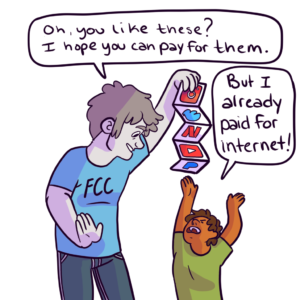The staff editorial is the majority opinion of The Murray State News Editorial Board.

When you log on to YouTube or Instagram, one expects these apps to load instantly. No buffering or delay, just entertainment the moment you need it. Barring spotty Wi-Fi, this isn’t too much to ask. This is largely thanks to the implementation of net neutrality. But the Federal Communications Commission (FCC) is putting this – and much more – at risk of being eradicated in order to please large media companies.
Net neutrality encompasses a number of principles which were designed to keep internet service providers (ISPs) from throttling, blocking or filtering information or services. Since 2015, these principles have helped ensure that everyone has access to the entirety of the internet with no restrictions. Companies found to be violating the tenets of net neutrality are fined heavily and reprimanded by the FCC.
And what happens if control of the internet is happily handed over to media empires?
You may have heard of internet “fast lanes,” a practice which grants quicker access to websites which fork over extra money. Smaller businesses who cannot afford to do so may be at a disadvantage. Those rallying for a repeal say this will never happen, but it already has.
Comcast was found to be throttling upload speeds for peer-to-peer services. The ISP, in recent comments submitted to the commission concerning the repeal of the principles, confirmed that it is not against implementing the practice if it gives their company an edge over the competition.
“Service tiers” is another term being thrown around. They would work much like cable packages: pay $25 a month for a certain number of channels, and to access others you have to upgrade. AT&T Inc. and Verizon Communications Inc. have already shown interest in this practice. And there will be little to stop them from doing so if FCC Chairman Ajit Pai has his way.
But perhaps the most important tenet of the net neutrality principles is the preservation of an open and free internet.
Censorship and website blocking is common practice in several countries. If a media company believes another entity is threatening its business (aka profits), they would likely be able to throttle speeds or block certain content from these entities. News organizations would also be at risk of being censored as many ISPs are backed by those with political agendas.
Surely there will be someone to protect us, right?
Well, a second proposal by Pai might put that at risk, too. He has shown interest in moving jurisdiction of the internet from the FCC to the Federal Trade Commission (FTC). In a recent decision by the Federal Appeals Court in California, the FTC has little to no control over broadband services. They can’t even keep these companies from selling your personal information. The proposal is surely a coincidence.
Currently, the internet is treated as public utility, not a luxury. This means that large companies have limited influence over the broadband market. They can sell access to the internet, but they cannot limit access.
Preserving the free market is the rallying cry for many opposed to net neutrality. Why should the government regulate the internet? Let businesses work it out, they say. Competition will force prices lower and give us more freedom, they argue. Innovation will suffer, they wail.
Does anyone expect Time Warner Cable Inc. to act in the best interests of the consumers? How about AT&T? Or AOL?
These companies serve the bottom dollar, not us. No one truly wants the government to regulate everything, but the alternative is dangerous.
It’s not too late to make yourself heard, though.
Websites such as www.battleforthenet.com, which is backed by Free Press, and www.savetheinternet.com are walking people through the process of petitioning for net neutrality. They will also put you in contact with relevant lawmaking persons. The resources are out there, so use them while they’re available.
On Dec. 14, the FCC will determine the fate of the open and free internet. And if there was ever a time to panic, it’s now.





























































































